
Timeline: Switzerland and the war in the Middle East since October 7, 2023
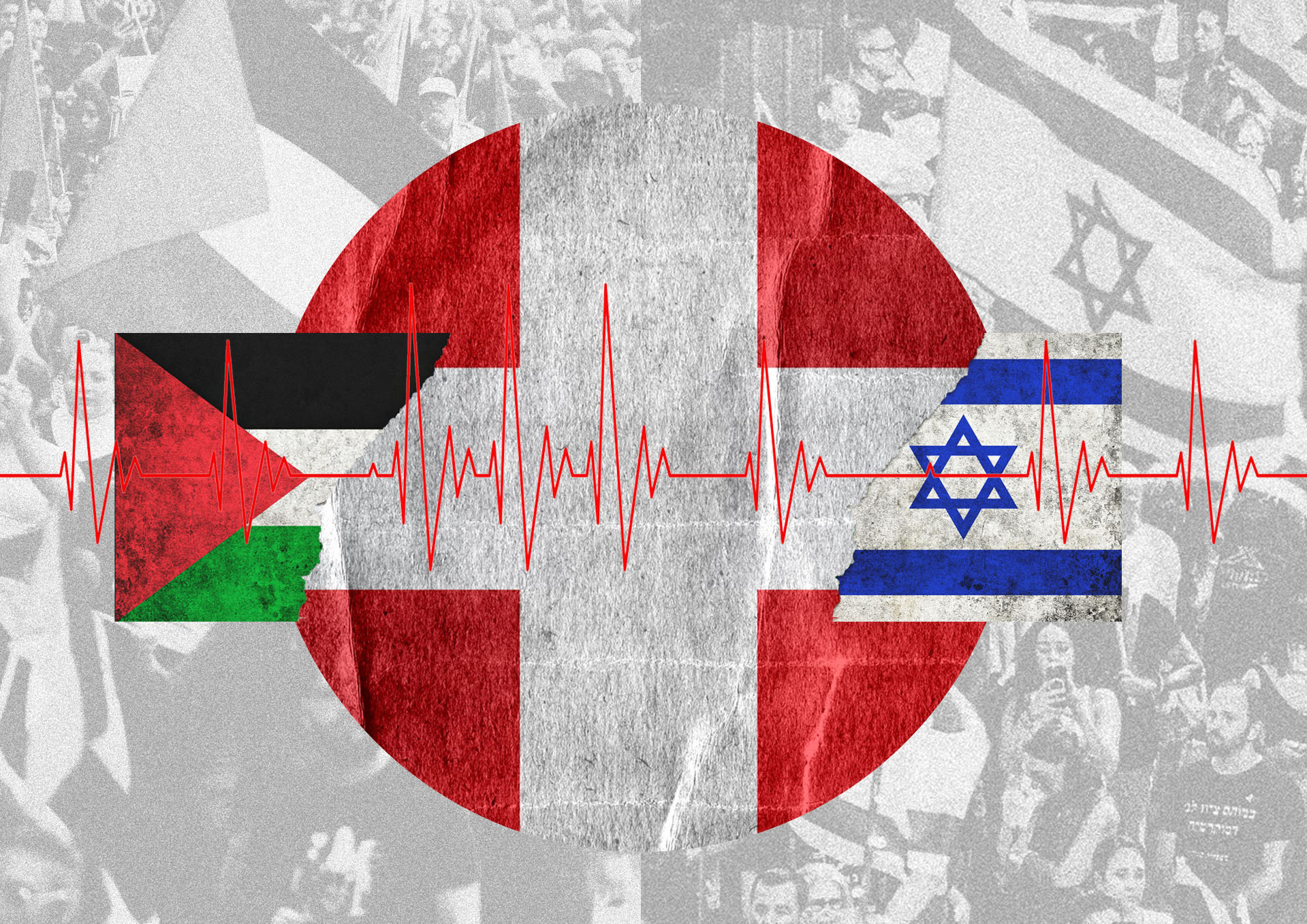
Since October 7, 2023, Switzerland, the depositary state of the Geneva Conventions, has repeatedly emphasised the need to end hostilities in the Middle East. But its positions have raised criticism for being too lenient towards Israel.
On October 7, 2023, Hamas alongside other armed Palestinian groups attacked Israel, killing more than 1,100 peopleExternal link and taking some 251 hostages to Gaza.
Israel responded with a large-scale military operation in the Gaza Strip. Palestinian health authorities say Israel’s ground and air campaign against Hamas militants has killedExternal link over 67,000 people since the war began two years ago.
In September, Israel launched an offensive on the city of Gaza, using airstrikes, artillery, and ground incursions. In a reportExternal link published September 16, a United Nations commission of inquiry says Israel has committed genocide against Palestinians in Gaza. Israel has rejected the findings of the report.
An international monitoring group warned in July that a worst-case scenario of famineExternal link was unfolding in Gaza since the Israeli army placed the enclave under humanitarian blockade in early March 2025.
Over the past two years Switzerland has continued to offer its good offices to support the resumption of peace talks. It has named Hamas a terrorist organisation, refrained from recognising a Palestinian state and considered ending its financial contributions to UNRWA, the United Nations agency that supports Palestinian refugees.
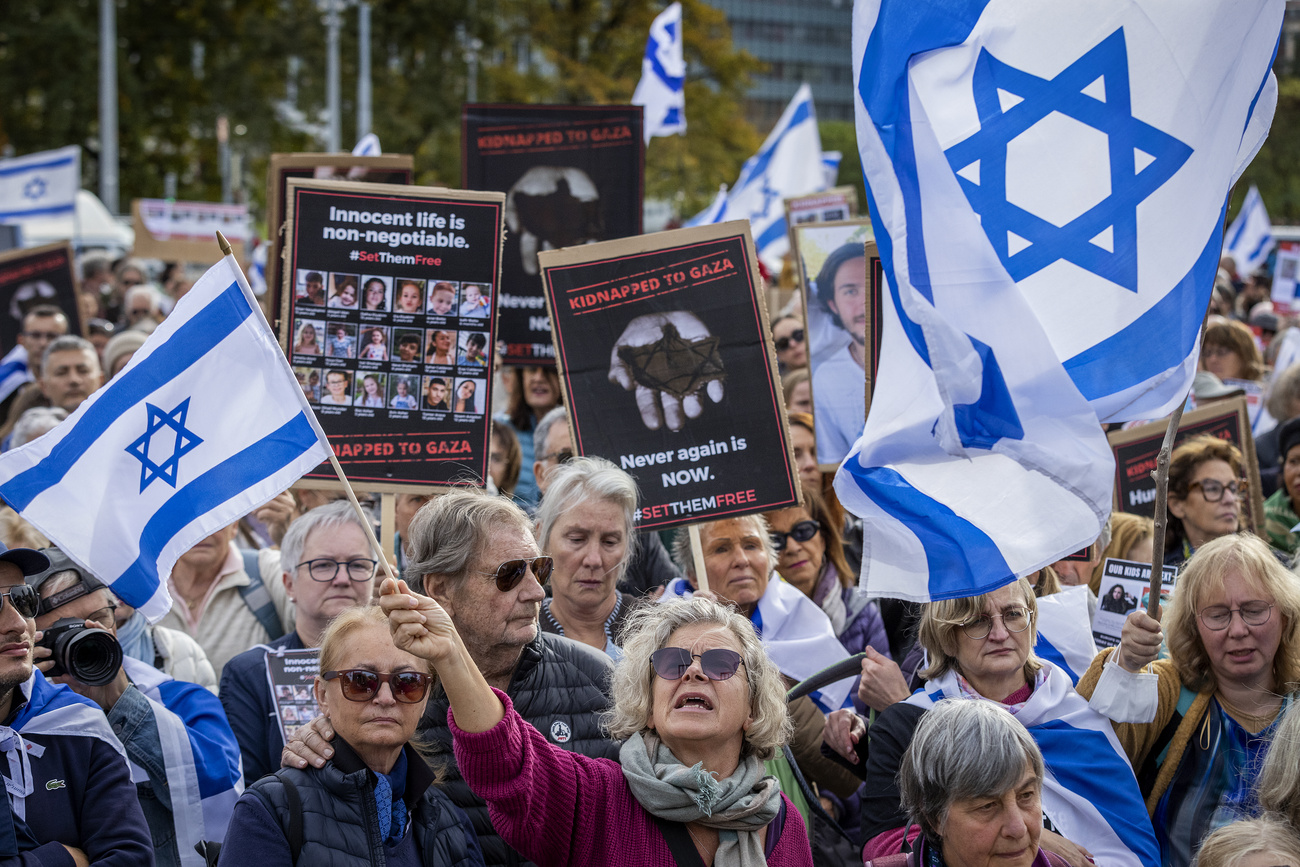
October to December 2023: Naming Hamas a terrorist organisation
Bern strongly condemned the acts of terrorism committed by Hamas, recognised Israel’s legitimate right to ensure its security and defence, and called on all parties to respect international humanitarian law to protect the civilian population.
In the wake of the attacks, it organised flights for some 700 Swiss residents from Tel Aviv to Zurich and provided CHF90 million ($113 million) for humanitarian aid to the Middle EastExternal link.
October 11: Four days after the attack, the Swiss government said it wanted to ban Hamas in Switzerland. A law was submitted in November which came into force in May 2025.
This is a reversal of Switzerland’s former Middle East policies of positioning itself as a mediating power and not designating Hamas as terrorist organisation.
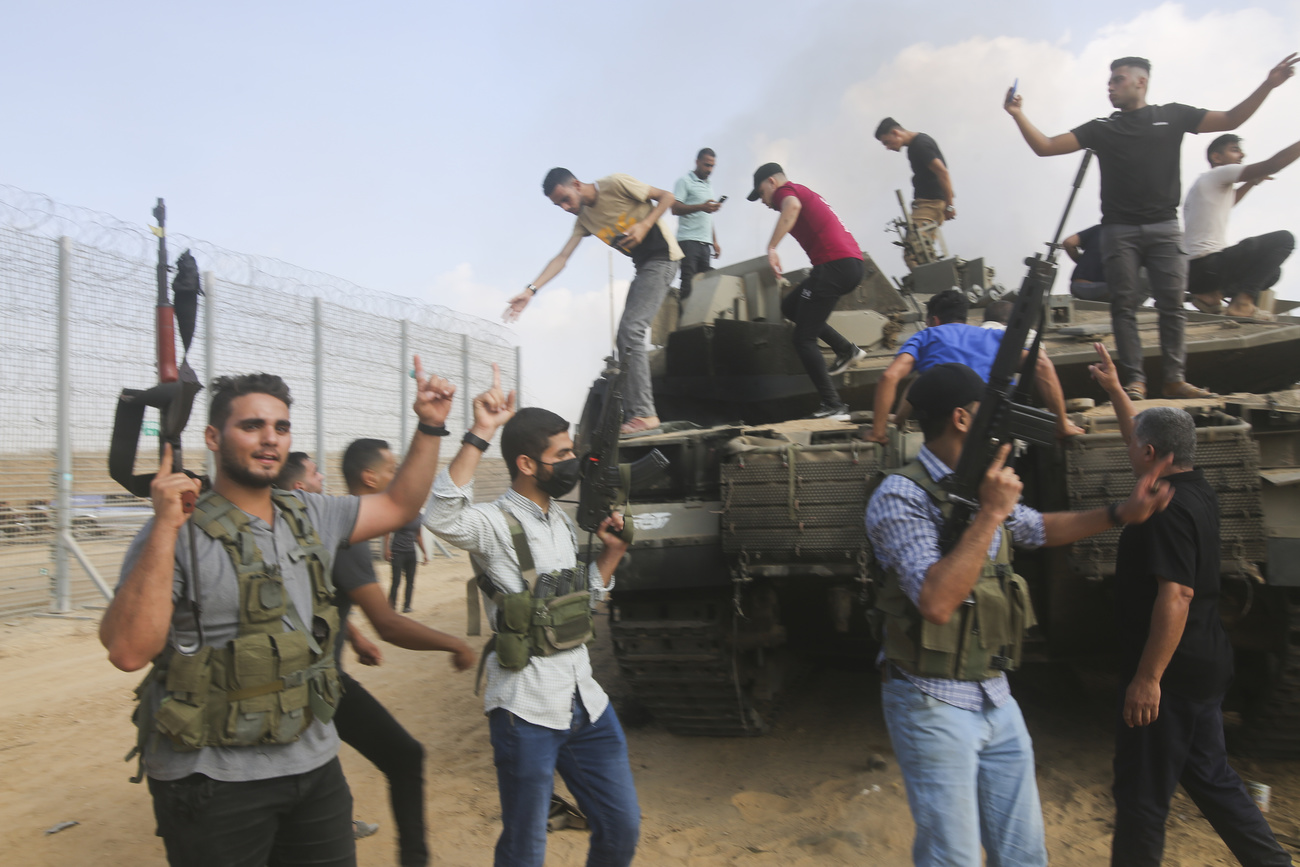
More
What does banning Hamas mean for neutral Switzerland?
December 29: As a non-permanent member of the United Nations Security Council in 2023 and 2024, SwitzerlandExternal link, which does not have veto power, emphasised the need for a lasting political solution in the Middle East in an emergency meeting in New York.
Switzerland reaffirmed its support for a two-state solution outlined by the UN, based on the borders of 1967External link.
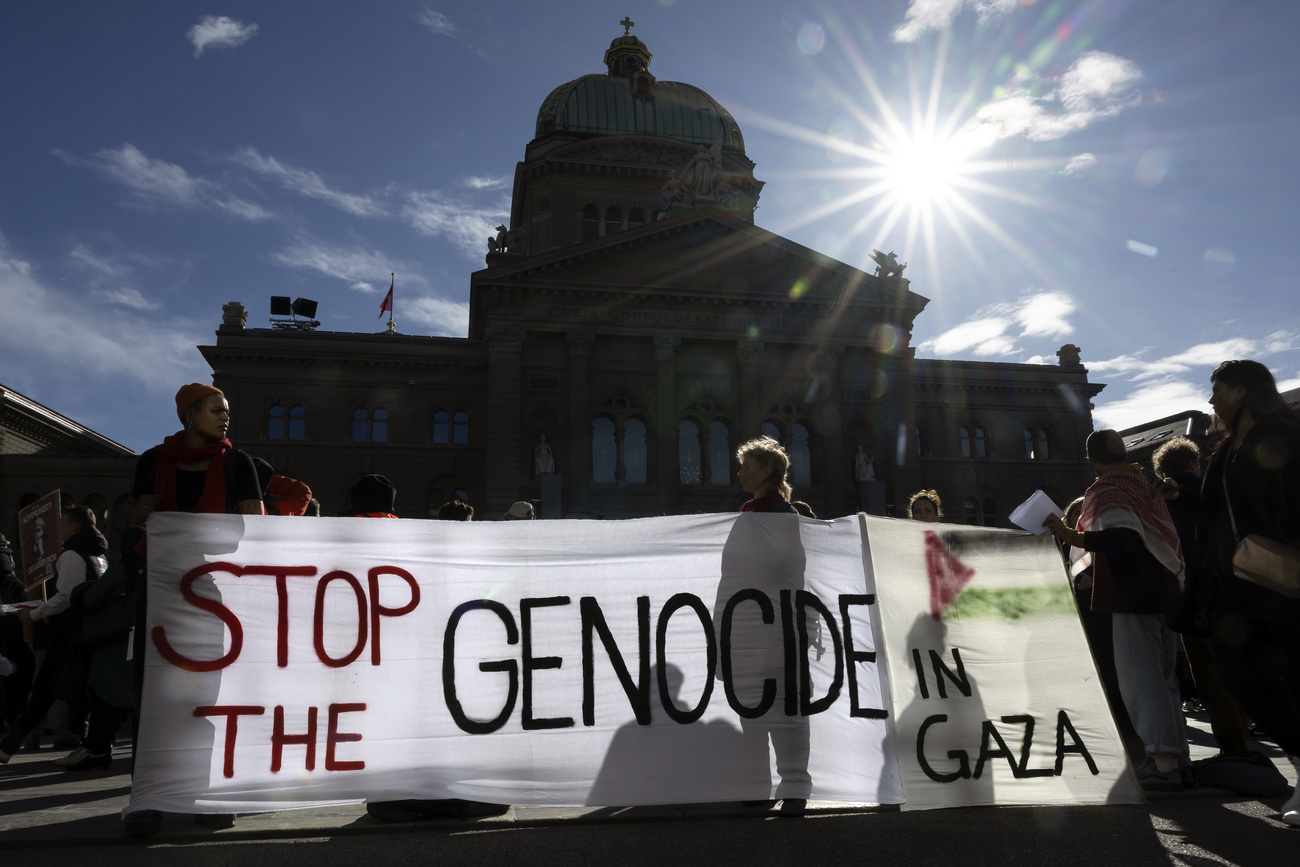
2024: Humanitarian aid crisis in Gaza
In 2024, Israel increased the scope of its military campaign in Gaza, involving sustained airstrikes, ground incursions, and the imposition of supply blockades. The humanitarian situation in Gaza deteriorated sharply, while violence also escalated in the West Bank between Israeli settlers, the Israeli army and Palestinians.
Despite repeated international appeals for de-escalation, no durable ceasefire was reached, and peace negotiations remained at a standstill.
Switzerland emphasised that all parties involved in the Israeli-Palestinian conflict must adhere strictly to international humanitarian law without exception and insisted on a two-state solution for Israel and Palestine.
Following allegations by Israel that several UNRWA staff took part in the Hamas attacks, the Swiss parliament held discussions throughout 2024 to end its contributions to the organisation.
Parliament concluded that any funding for UNRWA must first be discussed with the foreign affairs committees.
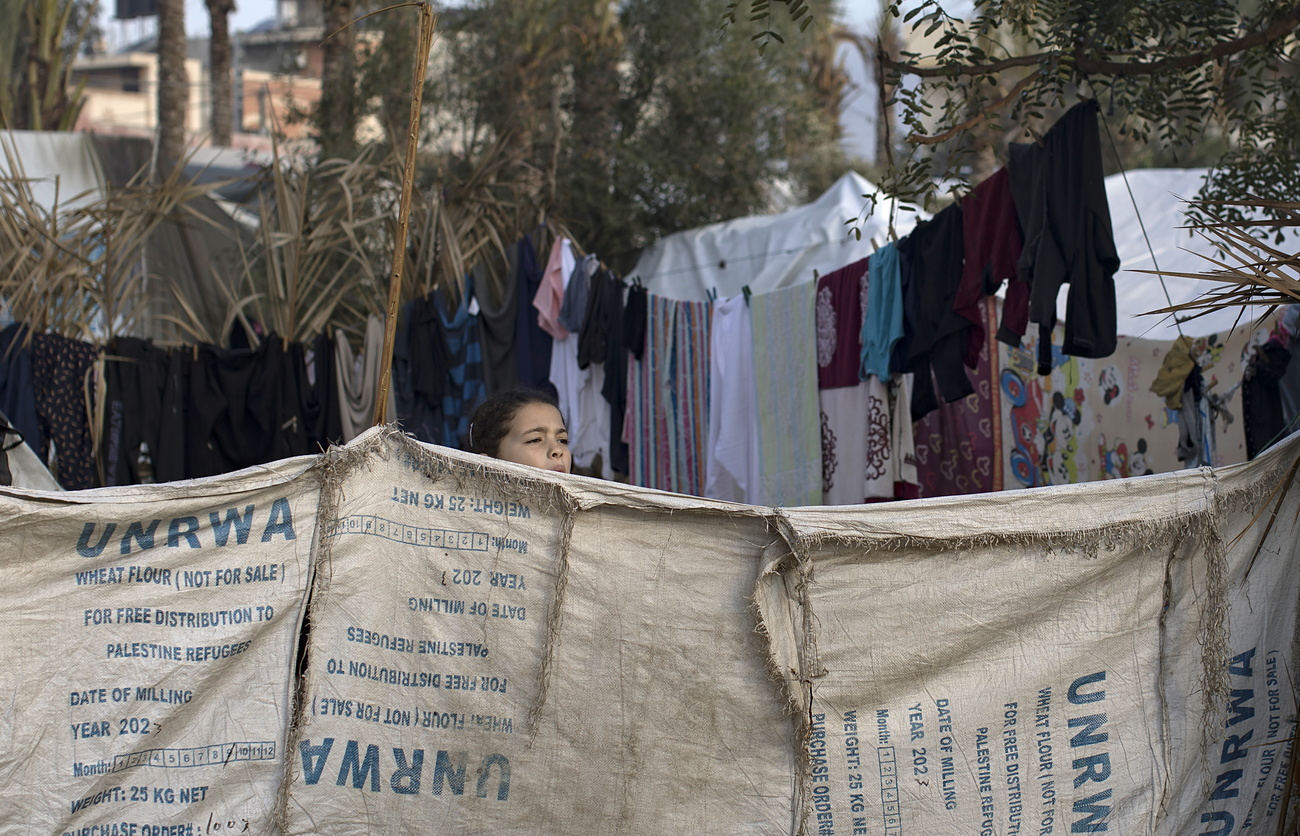
More
What are the allegations upending UNRWA’s aid efforts in Gaza?
April 18: The UN Security Council voted on a resolution to recommend Palestine for full membership at the UN. The resolutionExternal link received 12 votes in favour, two abstentions (from the United Kingdom and Switzerland), and was ultimately vetoed by the United States, one of the five permanent members of the Council.
This veto blocked the resolution from advancing to the UN General Assembly, where a two-thirds majority would have been required for Palestine to be admitted as a full member state.
Switzerland said it abstained from voting because it concluded that Palestine’s admission as a full member of the UN would not, at this stage, contribute to easing tensions or promoting peace efforts in the Middle East.
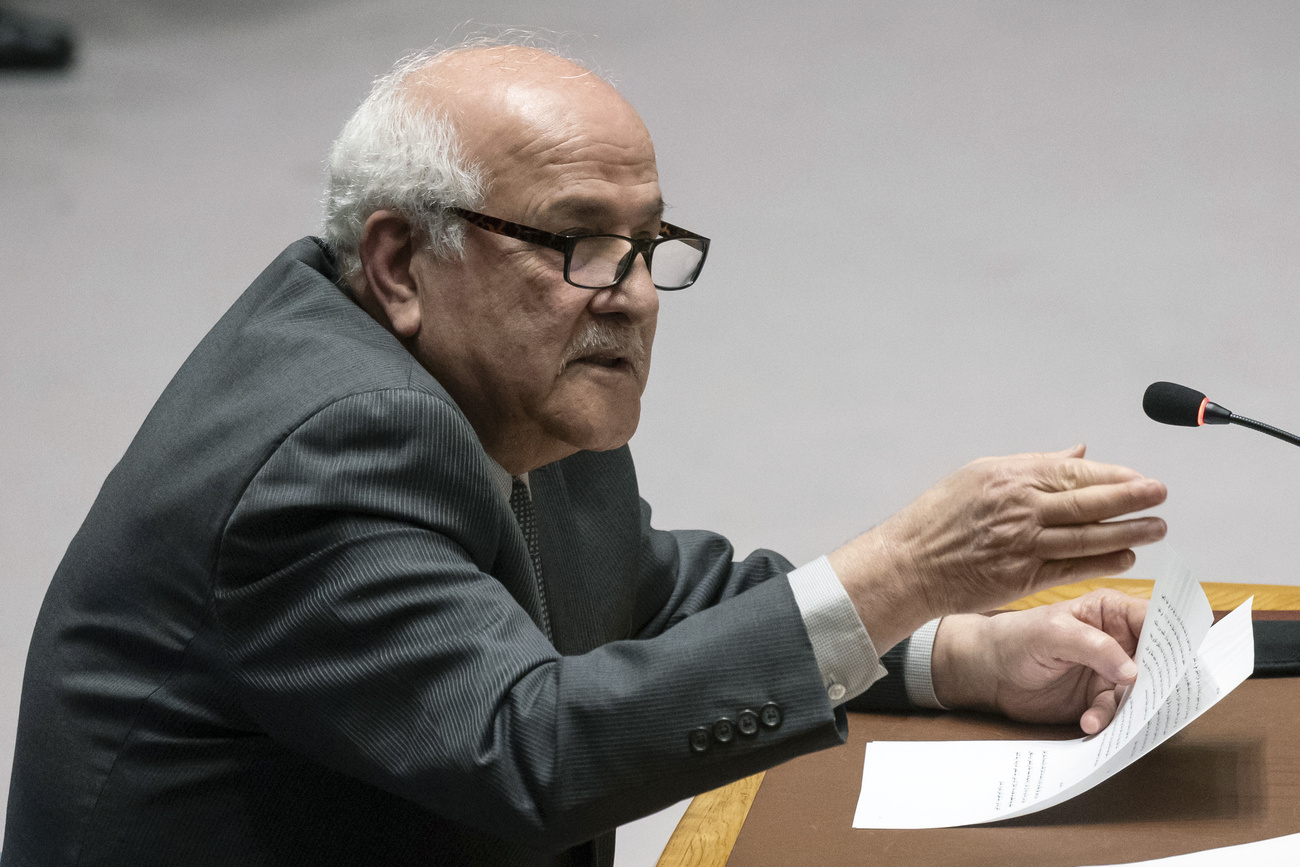
More
Switzerland abstains from vote to grant Palestine full UN membership
July 19: The International Court of Justice (ICJ) issued an advisory opinionExternal link declaring Israel’s presence in the occupied Palestinian territory as unlawful. Switzerland contributed to the ICJ advisory opinion and supported it.
September 18: Switzerland abstained from a UN General Assembly vote supporting the ICJ’s opinion, while reaffirming its commitment to international law. Switzerland argued that certain points in the resolution adopted on September 18 went beyond the advisory opinion, in particular a 12-month deadline for Israel’s withdrawal from the Occupied Palestinian Territory without mentioning how Israel’s security would be guaranteed. “Our abstention in no way diminishes our commitment to respect and ensure respect for international humanitarian law throughout the Occupied Palestinian Territory,” it saidExternal link.
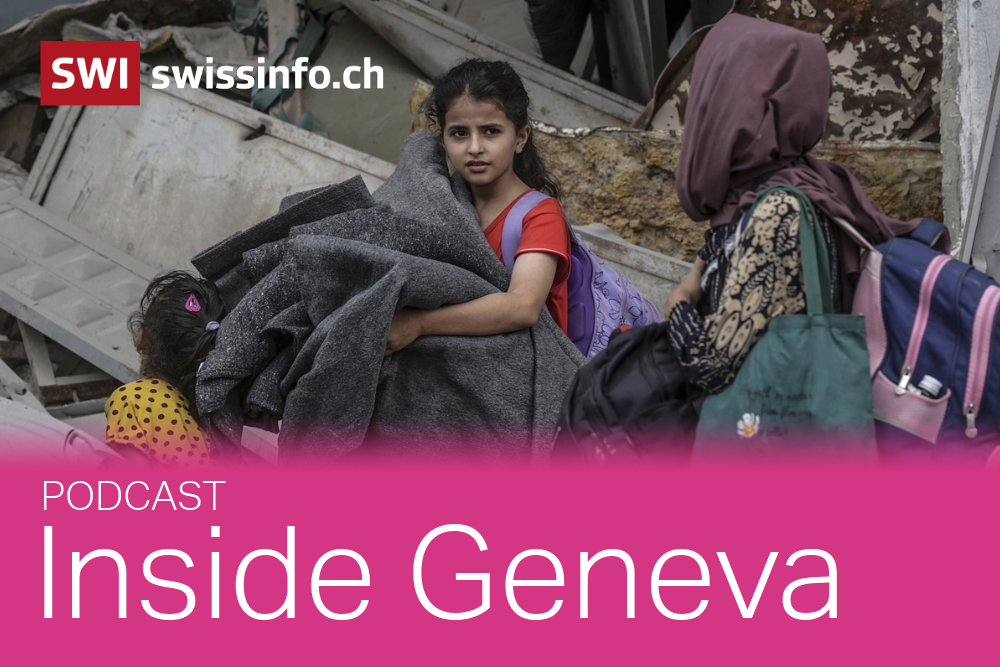
More
Inside Geneva special: a year of war in the Middle East
2025: Famine threatens the Gaza Strip
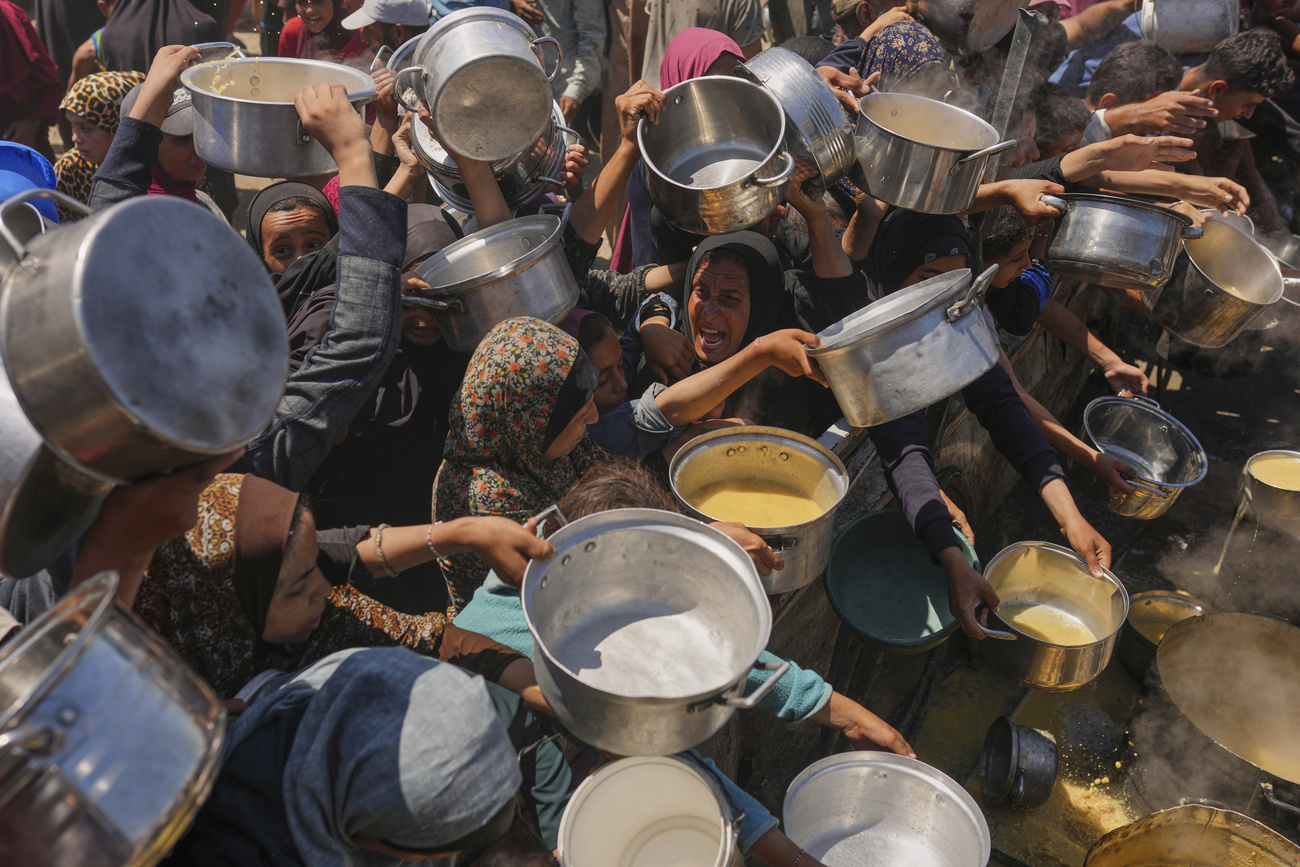
Despite persistent international appeals for a ceasefire, hostilities in the Middle East continue. Since July the whole of the population in Gaza has been at risk of starvation, according to the United NationsExternal link. This has prompted international criticism of Israel and pushed it to allow more aid into the enclave.
Israel’s UNRWA banExternal link came into effect on January 30, further complicating distribution of aid in Gaza. In addition, IsraelExternal link closed the Gaza border crossings, preventing food, water and humanitarian aid from entering the territory from March to mid-May.
March 6: A planned Geneva Conventions conference on civilian protection in Palestinian territories was cancelled due to deep disagreements among the involved parties. Switzerland was criticised for failing to hold the conference as mandated by the UN General Assembly. The goal of the conference was to reaffirm the protection of civilians and civilian property in occupied Palestinian territories.
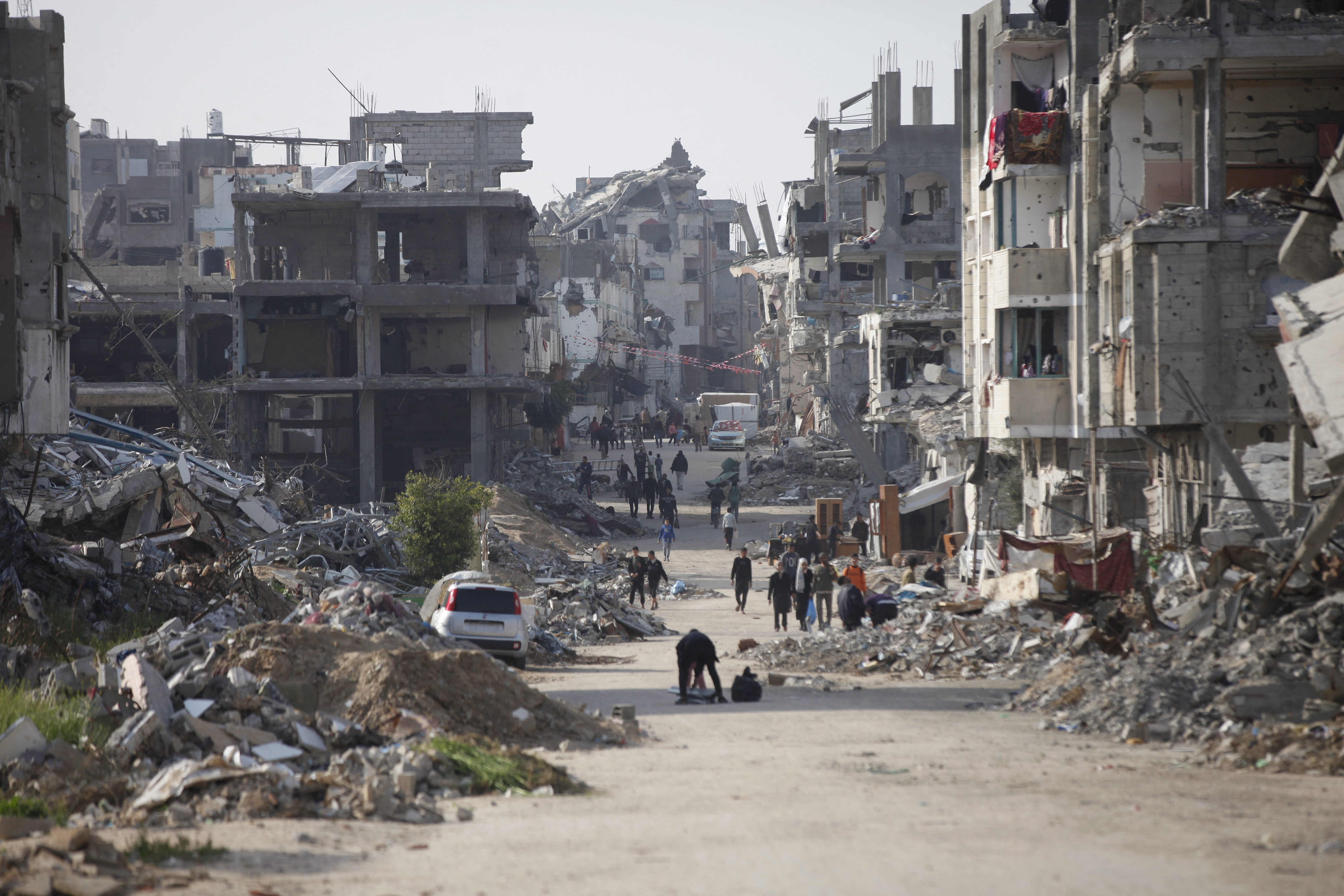
More
The international conference that Switzerland doesn’t want but must organise
May 15: Start of a five-year ban on Hamas in Switzerland.
May 21: Switzerland pledged to contribute CHF10 million ($12 million) to UNRWA in 2025, in line with last year’s contribution, to support its activities in Jordan, Lebanon and Syria.
May 30: The Swiss government condemned Israel’s approval of 22 new West Bank settlements in occupied Palestinian territories.

More
When aid to Gaza turns deadly
Early June: Foreign Minister Ignazio Cassis faced domestic criticism for his perceived leniency towards Israel. This is reiterated by his own team at the foreign ministry.
June 10-11: Cassis, under internal pressureExternal link, travelled to the Middle East, his first trip to the region since the Hamas attacks. During his visit to Jerusalem, Cassis emphasised Israel’s obligations under international humanitarian law, particularly its duty as an occupying power to ensure unimpeded humanitarian aid access. The Swiss foreign minister called on Israel to authorise more aid to Gaza. He also held talks with Palestinian Prime Minister Mohammad Mustafa in Ramallah.
July 2: The controversial Geneva-based Gaza Humanitarian Foundation (GHF), supported by the US and Israel, was dissolved in Switzerland. It will remain operational in the US. It was created in February 2025, with its initial registration in Geneva, as a replacement for UN-led humanitarian aid in the Gaza Strip.
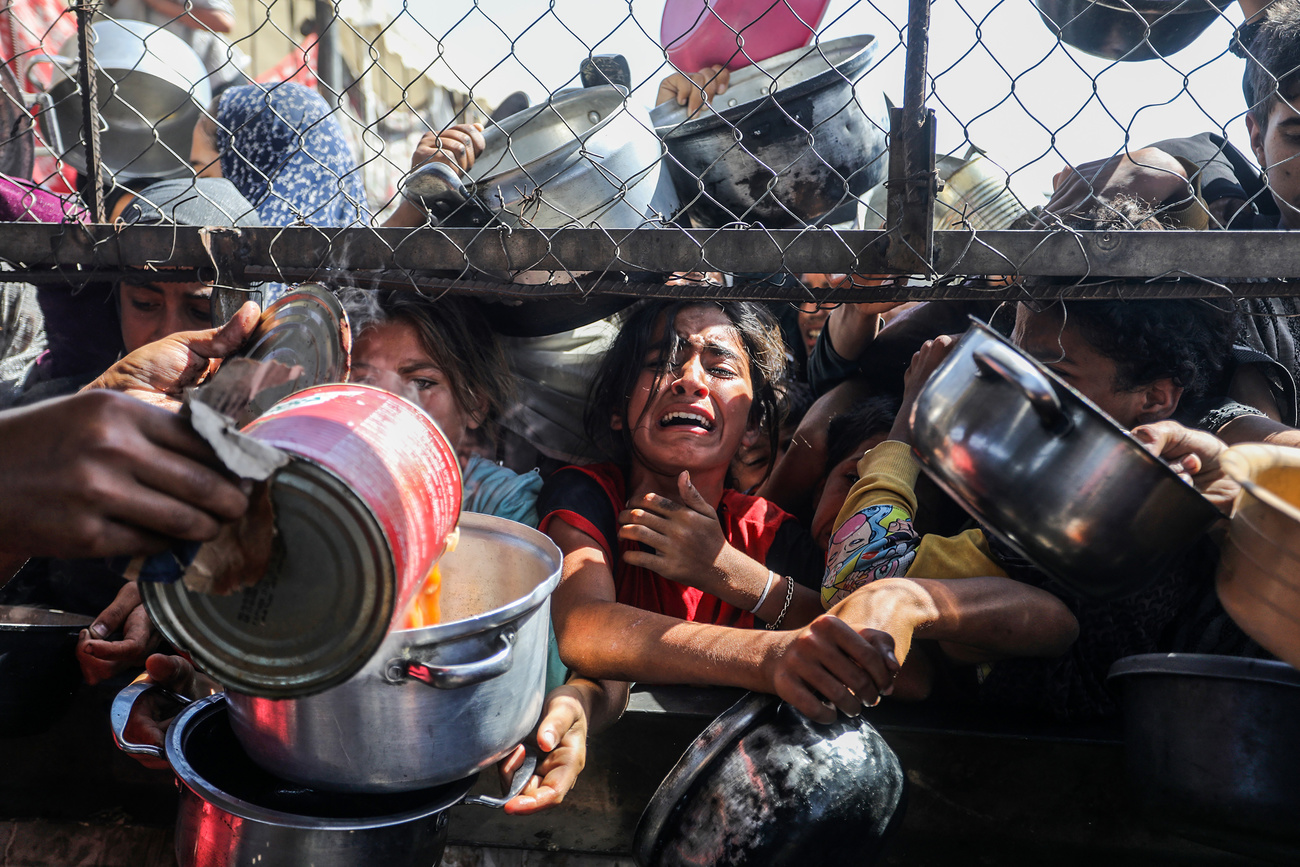
More
Gaza Humanitarian Foundation begins aid deliveries amid chaos and bloodshed
July 29: At the United Nations conference on the Middle East at the end of July, several Western countries, including the United Kingdom and Canada, indicated that they would recognise Palestine as an independent state. France had already announced its intention to do so. Switzerland refrained, arguing conditions are not met.
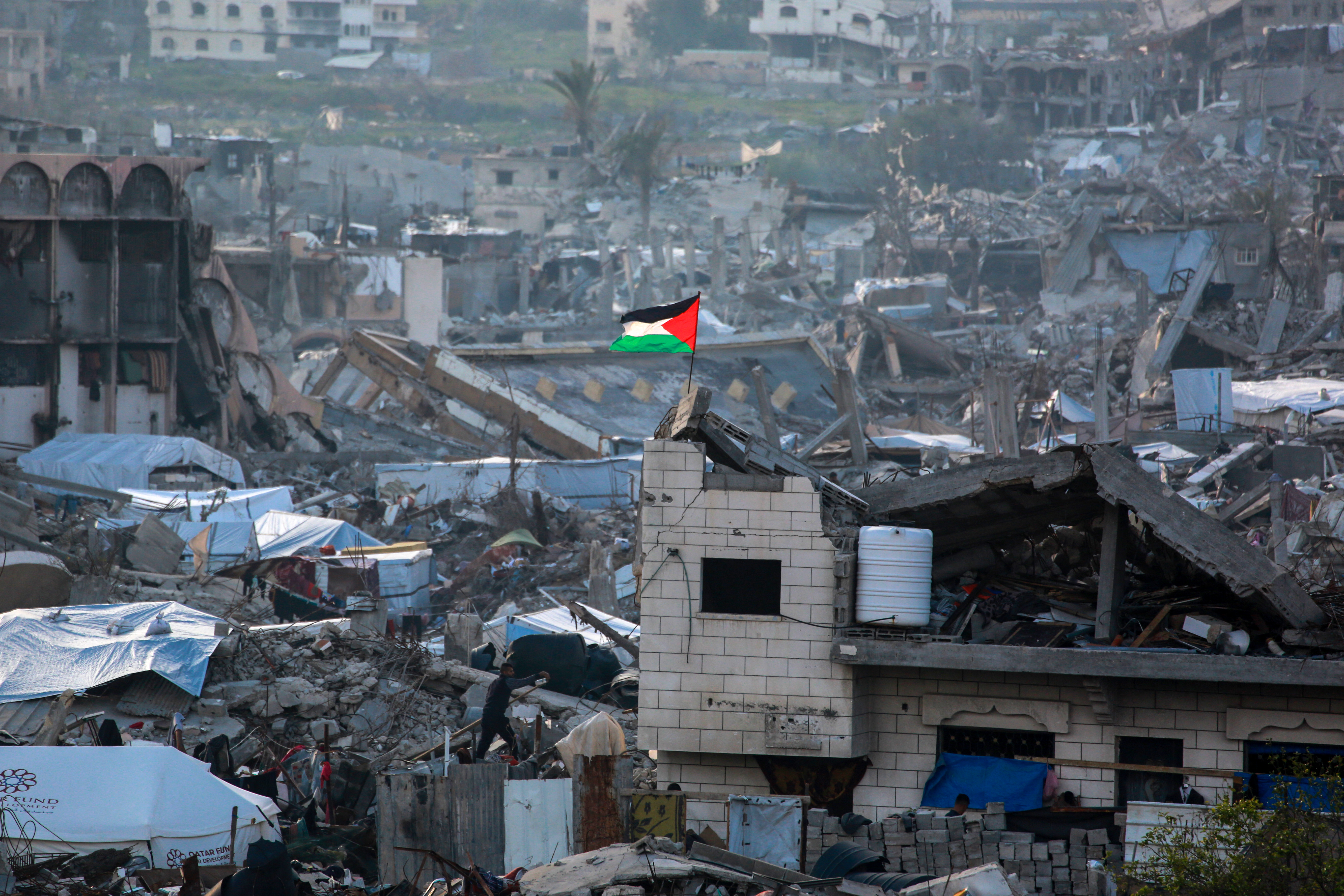
More
Why Switzerland doesn’t recognise Palestine as a state
August 12: “We need a ceasefire that can end the war,” declared 29 Western nations, including Switzerland, in August. “We are grateful to the US, Qatar and Egypt for their efforts in pushing for a ceasefire and pursuing peace. We need a ceasefire that can end the war, for hostages to be released and aid to enter Gaza by land unhindered,” the signatory countriesExternal link said.
September – October: Thousands demonstrated in several Swiss cities, including Geneva and Zurich, calling for an end to violence in Gaza and for a recognition of Palestine as a state. For the Swiss foreign ministry, the legal conditions for such a recognition are metExternal link; the government has hesitated to take such a step. The Senate also rejected a corresponding proposal. A people’s initiativeExternal link on the issue is planned.
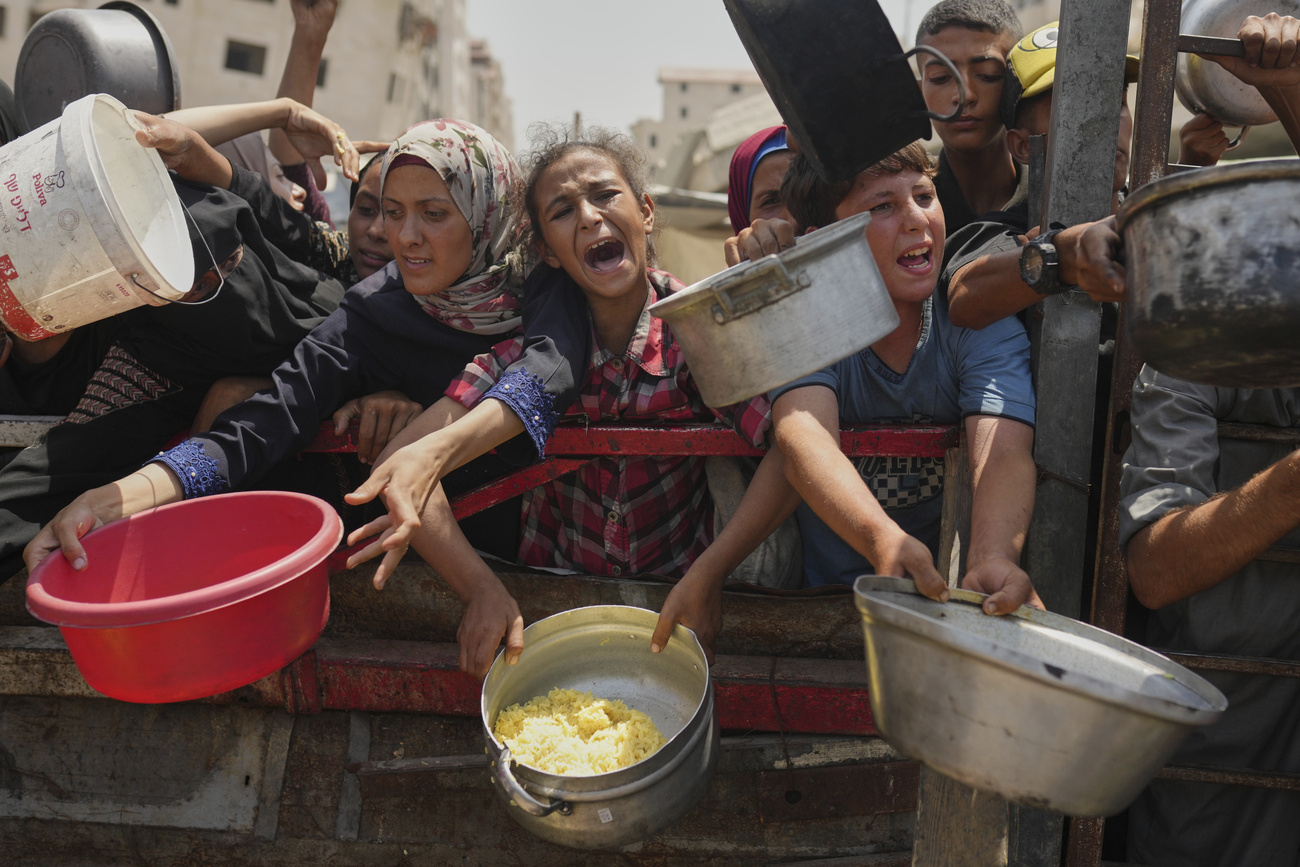
More
UN-backed report declaring famine in Gaza ‘important’ but won’t change much
October 5: Some 19 Swiss activists on the “Waves of Freedom” flotilla were detained in Israel after being stopped on the way to Gaza. The first of these to return to Switzerland spoke of being treated badlyExternal link during their detention. The Swiss foreign ministry demanded access to the detainees, and planned a letter of protest to Israel after a visit by Swiss diplomats was cancelled.
October 7: On the anniversary marking two years since the Hamas attacks, Swiss President Karin Keller-Sutter called for peace. “Two years after the terrorist attacks by Hamas against Israel, our thoughts are with all those suffering. It is high time to end the violence. Hamas must release all hostages. The despair and immense pain must come to an end. Peace is the only path forward,” Keller-Sutter wrote on X.
>>>The following article addresses Switzerland’s relationship with and actions in the Middle East conflict from 1897, the year in which the first Zionist Congress was held in Basel, until October 7, 2023:
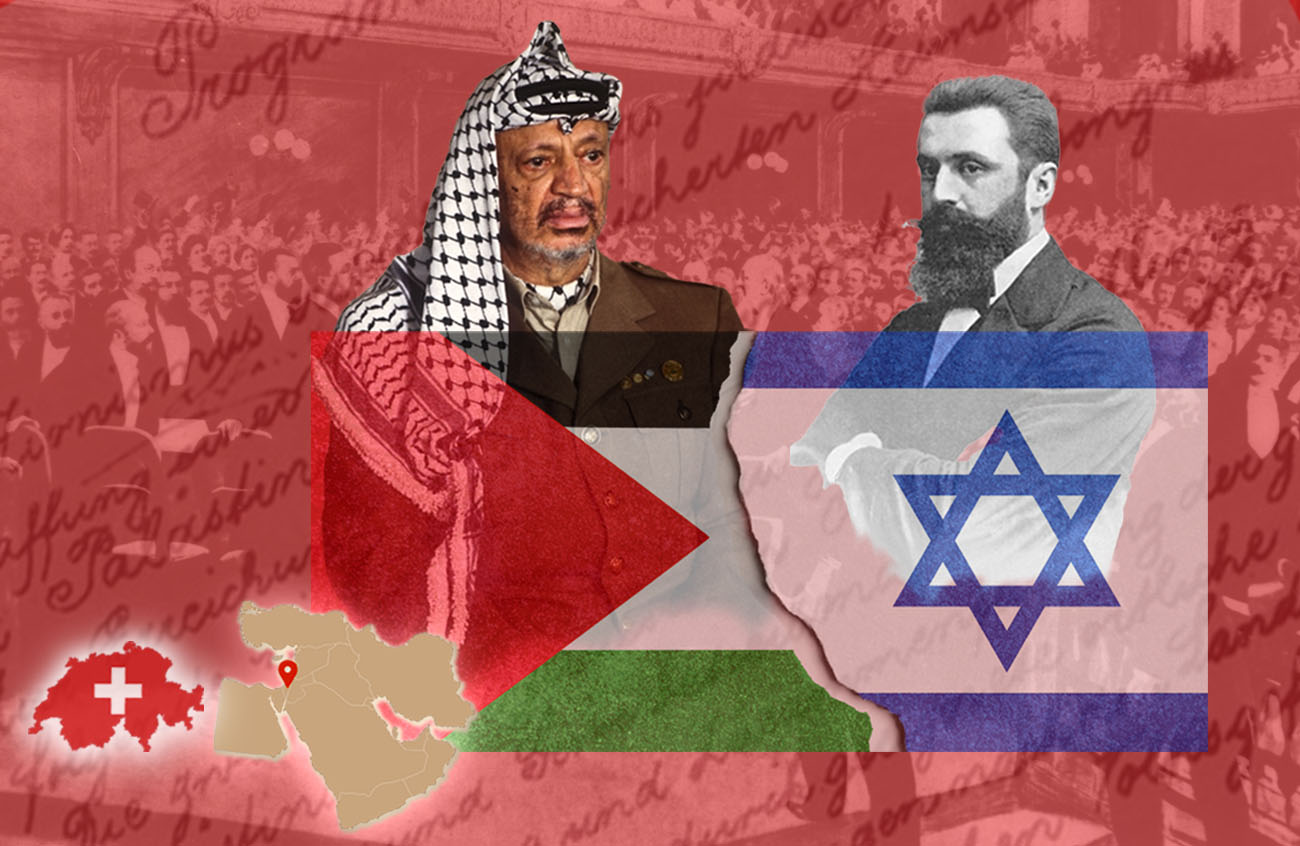
More
Timeline: Switzerland and the conflict in the Middle East
Additional reporting by May Elmahdi-Lichtsteiner. Edited by Virginie Mangin/livm/ts
This article was updated on October 7, 2025.

In compliance with the JTI standards
More: SWI swissinfo.ch certified by the Journalism Trust Initiative



























You can find an overview of ongoing debates with our journalists here . Please join us!
If you want to start a conversation about a topic raised in this article or want to report factual errors, email us at english@swissinfo.ch.